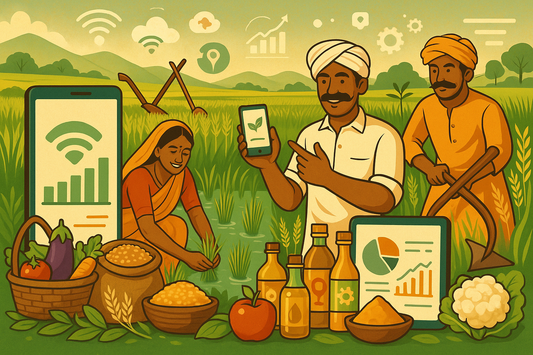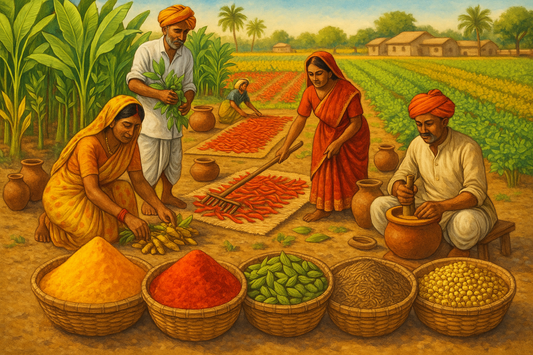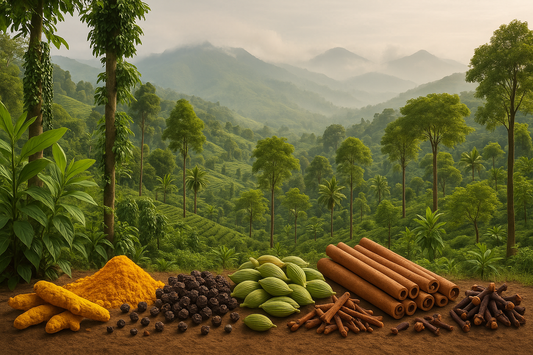
Wayanad Coffee
Share
Are you looking for a high-quality coffee powder that not only tastes great but also offers numerous health benefits? Look no further than Wayanad Coffee Powder. This unique blend of coffee is not only delicious but also packed with nutrients that can boost your overall well-being.
What sets Wayanad Coffee Powder apart?
Wayanad Coffee Powder is made from premium coffee beans grown in the picturesque hills of Wayanad, Kerala. These beans are carefully selected and roasted to perfection, resulting in a rich and flavorful coffee powder that is unmatched in quality.
Health benefits of Wayanad Coffee Powder
1. Rich in antioxidants: Wayanad Coffee Powder is loaded with antioxidants that help fight inflammation and protect your cells from damage.
2. Boosts metabolism: The caffeine in Wayanad Coffee Powder can help increase your metabolic rate, leading to improved energy levels and potential weight loss.
3. Enhances brain function: The caffeine and other compounds in Wayanad Coffee Powder can improve brain function, including memory, mood, and overall cognitive performance.
How to enjoy Wayanad Coffee Powder
For the best flavor and maximum health benefits, it is recommended to brew Wayanad Coffee Powder using a French press or pour-over method. This will ensure that you get the full depth of flavor and nutrients from the coffee beans.
Whether you prefer your coffee black or with a splash of milk, Wayanad Coffee Powder is sure to satisfy your taste buds and provide you with a much-needed energy boost to start your day.
Experience the rich taste and health benefits of Wayanad Coffee Powder today!

Wayanad Coffee: Origin Wayanad
India's Wayanad region (pronounced "why-nad") is nestled in the lush, mountainous area of Kerala, a southern state in India. Located at an altitude of 900-2,100 meters above sea level, Wayanad is known for its rich biodiversity and fertile lands. An interesting fact about the region is that it's home to one of the largest tribal populations in India, with over 50 different tribes residing there.
History Of the Region
Coffee has been cultivated in the Wayanad region for over 250 years. The British introduced coffee plantations in the late 18th century during their colonial rule in India. In the mid-19th century, the Arabica variety of coffee was introduced to the region, which thrived in the high-altitude climate. Today, Wayanad coffee is recognized globally for its distinctive taste and aroma, contributing significantly to India's coffee production.
Farming & Processing Methods
While specific farming and processing methods may vary among individual farms, generally, coffee in Wayanad is grown using traditional, eco-friendly techniques. Most coffee farms in the region are small-scale and family-owned, with coffee plants cultivated under the shade of taller trees such as silver oak and jackfruit. This method not only preserves the region's rich biodiversity but also results in higher-quality coffee beans.
The primary coffee processing method used in India, including the Wayanad region, is the wet or washed process. The outer skin and pulp of the coffee cherries are removed using a pulping machine, and the beans are then fermented in water for up to 48 hours to remove the remaining mucilage. After fermentation, the beans are washed thoroughly and laid out to dry, either on concrete patios or raised drying beds. Once the beans have reached the desired moisture content, they are hulled to remove the parchment layer and sorted by size and density before being bagged and shipped.
Tasting Notes
Wayanad coffee is known for its bright, fruity acidity and medium body. The Arabica beans grown in this region often exhibit flavors of ripe fruit, such as black currant and cherry, as well as subtle floral and citrus notes. The Robusta beans, which also grow in Wayanad, tend to have a more robust, earthy profile with hints of cocoa and spice. The combination of these unique flavors and the region's high-altitude growing conditions makes Wayanad coffee a sought-after specialty coffee.








